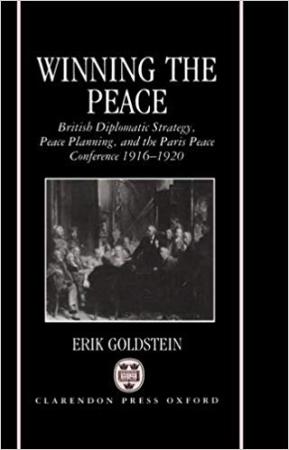This year is the Centennial of the signing of the Treaty of Versailles. Signed on 28 June 1919 in the Hall of Mirrors at Versailles Palace, the Treaty was the most important of the peace treaties that brought an end to World War I. To mark this anniversary, the Peace Palace Library has put together a collection of books exploring the background and aftermath of the Versailles Treaty. This collection will be published on the website and social media. Part III: British Aims in Paris.
During the Paris Peace Conference and for the most of the period after 1919, the aims, interests, and policies of Britain differed fundamentally from those of France. The conflict was not always visible, either because compromises were reached, often at the expense of a third power, or because one country, in order to gain some support which it needed, submitted to the will of the other. Neither of the two countries was able to pursue unhampered the course it laid out for itself.
Great Britain had suffered huge casualties but little land devastation during the war. However, the British wartime coalition was re-elected at the end of 1918, with a policy of squeezing the German "'til the pips squeak". Public opinion favoured a "just peace", which would force Germany to pay reparations and be unable to repeat the aggression of 1914, although those of a "liberal and advanced opinion" shared Wilson's ideal of a peace of reconciliation.
For the British, security had been attained: a new war in Western Europe lay in too remote a future to be of any practical concern. The problem which worried the British was how to 'wipe out the past', that is, to 'dissipate the surviving atmospere of war', so as 'to create a new temper in Europe' and restore peace, normalcy, and economic stability. In private British prime minister Lloyd George opposed revenge and attempted to compromise between Clemenceau's demands and the Fourteen Points, because Europe would eventually have to reconcile with Germany. Lloyd George wanted terms of reparation that would not cripple the German economy, so that Germany would remain a viable economic power and trading partner. By arguing that British war pensions and widows' allowances should be included in the German reparation sum, Lloyd George ensured that a large amount would go to the British Empire.
Lloyd George also intended to maintain a European balance of power to thwart a French attempt to establish itself as the dominant European power. A revived Germany would be a counterweight to France and a deterrent to Bolshevik Russia. Lloyd George also wanted to neutralize the German navy to keep the Royal Navy as the greatest naval power in the world; dismantle the German colonial empire with several of its territorial possessions ceded to Britain and others being established as League of Nations mandates, a position opposed by the Dominions.
Great Britain, Versailles and Books
- Goldstein, E., Winning the Peace: British Diplomatic Strategy, Peace Planning, and the Paris Peace Conference, 1916-1920, Oxford, Clarendon, 1991.
- Jordan, W.M., Great Britain, France, and the German Problem 1918-1939, London etc., Oxford University Press, 1943.
- Kleine-Ahlbrandt, W.L., The Burden of Victory: France, Britain and the Enforcement of the Versailles Peace, 1919-1925, Lanham, New York, London, University Press of America, Inc., 1995.
- Tilman, S.P., Anglo-American Relations at the Paris Peace Conference of 1919, Princeton, NJ, Princeton University Press, 1961.
- Wolfers, A., Britain and France between Two Wars: Conflicting Strategies of Peace since Versailles, New York, Harcourt, Brace and Company, 1940.
Treaty of Versailles Centennial
The Treaty of Versailles was the most important of the peace treaties that brought World War I to an end. The Treaty ended the state of war between Germany and the Allied Powers. It was signed exactly five years after the assassination of Archduke Franz Ferdinand, which had directly led to the war. The other Central Powers on the German side signed separate treaties. Although the Armistice, signed on 11 November 1918, ended the actual fighting, it took six months of Allied negotiations at the Paris Peace Conference to conclude the peace treaty. The treaty was registered by the Secretariat of the League of Nations on 21 October 1919.
